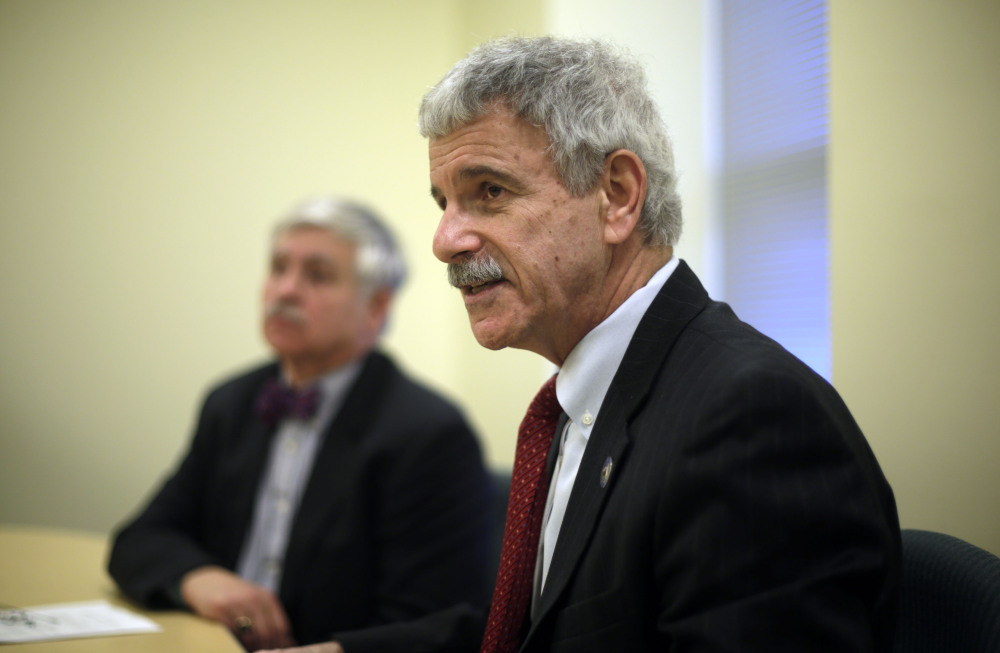AUGUSTA — A proposal from two Republican lawmakers to expand the state’s Medicaid program to more than 60,000 low-income residents and establish a managed care system for all 320,000 beneficiaries inched forward Monday.
Democrats on the Legislature’s Health and Human Services Committee approved L.D. 1487 in a party-line vote of 7-5. The bill, sponsored by Assistant Senate Minority Leader Roger Katz, R-Augusta, and Sen. Thomas Saviello, R-Wilton, is designed to attract Republican votes to back what has been a largely Democrat-led effort to expand the public health insurance program for the poor.
The bill’s managed care provision, which Katz said would help the state reduce costs in the $2.5 billion program, is one of several measures included to bring along enough Republican votes to circumvent an anticipated veto by Gov. Paul LePage.
Nonetheless, Republican-led resistance to the proposal remains strong. Rep. Carol McElwee, R-Caribou, a member of the health committee, supported Medicaid expansion last year, but said Monday that constituents in her district did not want expansion. She said the majority of the calls she had received urging her to support the bill were from people living in Portland.
“I supported MaineCare (Maine’s version of Medicaid) last year because I thought it was the ethical thing to do,” she said. “I’ve changed my mind. I’m not for managed care. . . . I’m still interested in helping people,” but there are other ways besides Medicaid.
McElwee’s vote is a blow for House Democrats, who fell three votes shy of overriding LePage’s veto of expansion last year and saw the managed care provision as a key concession in Katz’s bill.
Rep. Drew Gattine, D-Westbrook, said he is ambivalent about managed care, but the bill is the only way forward. He said it is unfortunate that the Medicaid debate has been so divisive in Maine when other states with divided government had achieved compromises.
“This administration and the (Department of Health and Human Services) have not budged one inch,” he said.
The LePage administration has continued its campaign to defeat expansion, claiming last week that it would harm the environment because the program would crowd out funding for state-led natural resource protection.
More recently, Mary Mayhew, the governor’s health and human services commissioner, attacked the analysis and motives of the Legislature’s nonpartisan budget office, which issued an estimate that the bill would cost the state $683,520 over the first three years of expansion. That’s considerably less than projections from the LePage administration, which has leaned on the controversial analysis of a consultant.
The deeply entrenched positions and the partisan nature of the debate loom over the bill as it moves to the Senate and House for floor votes.
Expansion would extend health insurance to an estimated 60,000 to 70,000 adults who have no children and earn as much as 133 percent of the federal poverty level – just over $15,558 a year for an individual – while providing an economic boost to hospitals and health care providers.
Proponents of managed care say it improves the efficiency of Medicaid and saves money while installing benchmarks for health outcomes. Opponents worry that managed care can lead providers to deny care if they’re close to the payment caps set by the state.
National data show that managed care in Medicaid is becoming more common as states try to control spending.
The Kaiser Family Foundation reported that the percentage of Medicaid recipients enrolled in some form of managed care increased from 57 in 2002 to 66 in 2012. Managed care is used in at least 45 states, according to the U.S. Department of Health and Human Services.
The Kaiser foundation also found that savings through managed care produced mixed results, and that significant savings were largely dependent on how states crafted their plans. The key savings drivers, the report said, were reduced emergency room use and improved use of primary care physicians.
Steve Mistler can be contacted at 791-6345 or at:
smistler@pressherald.com
Twitter: @stevemistler
Send questions/comments to the editors.



Success. Please wait for the page to reload. If the page does not reload within 5 seconds, please refresh the page.
Enter your email and password to access comments.
Hi, to comment on stories you must . This profile is in addition to your subscription and website login.
Already have a commenting profile? .
Invalid username/password.
Please check your email to confirm and complete your registration.
Only subscribers are eligible to post comments. Please subscribe or login first for digital access. Here’s why.
Use the form below to reset your password. When you've submitted your account email, we will send an email with a reset code.